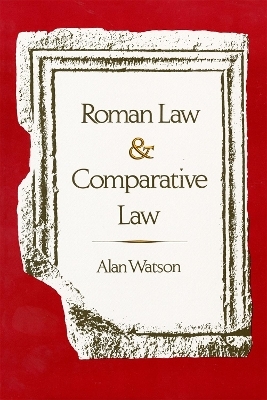
Roman Law and Comparative Law
Seiten
1991
University of Georgia Press (Verlag)
978-0-8203-1261-3 (ISBN)
University of Georgia Press (Verlag)
978-0-8203-1261-3 (ISBN)
Watson examines the ways in which Roman law influenced later legal systems and how comparative law explains the role of law in society. For example, he examines the structure of European legal systems, tort law in the French civil code, and differences between contract law in France and Germany.
To understand how law develops and how legal rules and structures relate to society, one must examine the issues both comparatively and historically, Alan Watson asserts. And in the Western world, he adds, in order to understand law comparatively, one must have knowledge of Roman law.
As his title suggests, Watson has divided the book into two related but independent parts. The first part, a revised and enlarged version of his 1970 volume The Law of the Ancient Romans, provides a comprehensive description of the system of Roman law. Watson begins with a discussion of law and the Roman mind and proceeds to such topics as slavery, property, contracts, delicts, and succession. In part two he argues that comparative law--an area of study still in its infancy--can help us "to identify the circumstances in which law changes, thereby uncovering the causes of legal development."
Guided by this purpose, Watson examines the ways in which Roman law influenced later legal systems and how comparative law explains the role of law in society. He ties his explication throughout to individual issues. These include the structure of European legal systems, tort law in the French civil code, the structure of Blackstone's Commentaries on the Law of England, differences between contract law in France and Germany, the parameters of judicial reasoning, lessons to be drawn from feudal law, and the interests of governments in making and communicating law. He takes care to discriminate between law created by legislatures and law conceived by scholarly jurists or judges.
To understand how law develops and how legal rules and structures relate to society, one must examine the issues both comparatively and historically, Alan Watson asserts. And in the Western world, he adds, in order to understand law comparatively, one must have knowledge of Roman law.
As his title suggests, Watson has divided the book into two related but independent parts. The first part, a revised and enlarged version of his 1970 volume The Law of the Ancient Romans, provides a comprehensive description of the system of Roman law. Watson begins with a discussion of law and the Roman mind and proceeds to such topics as slavery, property, contracts, delicts, and succession. In part two he argues that comparative law--an area of study still in its infancy--can help us "to identify the circumstances in which law changes, thereby uncovering the causes of legal development."
Guided by this purpose, Watson examines the ways in which Roman law influenced later legal systems and how comparative law explains the role of law in society. He ties his explication throughout to individual issues. These include the structure of European legal systems, tort law in the French civil code, the structure of Blackstone's Commentaries on the Law of England, differences between contract law in France and Germany, the parameters of judicial reasoning, lessons to be drawn from feudal law, and the interests of governments in making and communicating law. He takes care to discriminate between law created by legislatures and law conceived by scholarly jurists or judges.
ALAN WATSON, Distinguished Research Professor and Ernest P. Rogers Chair at the University of Georgia School of Law, is regarded as one of the world's foremost authorities on Roman law, comparative law, legal history, and law and religion. He is the author of numerous books, including The State, Law, and Religion: Pagan Rome (Georgia) and Roman Law and Comparative Law (Georgia). He is also the editor of the four-volume translation of the Digest of Justinian.
| Erscheint lt. Verlag | 30.6.1991 |
|---|---|
| Verlagsort | Georgia |
| Sprache | englisch |
| Maße | 152 x 229 mm |
| Gewicht | 544 g |
| Themenwelt | Recht / Steuern ► Allgemeines / Lexika |
| Recht / Steuern ► EU / Internationales Recht | |
| Recht / Steuern ► Rechtsgeschichte | |
| ISBN-10 | 0-8203-1261-4 / 0820312614 |
| ISBN-13 | 978-0-8203-1261-3 / 9780820312613 |
| Zustand | Neuware |
| Informationen gemäß Produktsicherheitsverordnung (GPSR) | |
| Haben Sie eine Frage zum Produkt? |
Mehr entdecken
aus dem Bereich
aus dem Bereich
Sammlung des Zivil-, Straf- und Verfahrensrechts, Rechtsstand: 14. …
Buch | Hardcover (2024)
C.H.Beck (Verlag)
CHF 53,20
Klausuren, Hausarbeiten, Seminare, Bachelor- und Masterarbeiten
Buch | Softcover (2021)
C.H.Beck (Verlag)
CHF 17,95


